

By John Helmer, Moscow
@bears_with
British government officials. state prosecutors, and police have lied repeatedly in announcements over the past three years that they have issued European Arrest Warrants charging three Russian military officers with attempted murder using the Novichok chemical weapon against targets in England.
The three Russians have been named in official British press releases as Alexander Petrov (also known as Alexander Mishkin); Ruslan Boshirov (Anatoly Chepiga); and Denis Sergeyev (Sergei Fedotov – lead image).
This week a spokesman for the Crown Prosecution Service (CPS) in London declared: “I can confirm that European Arrest Warrants have been issued for all three suspects.” Asked for proof, a senior CPS official refused, announcing: “We have nothing further to add.”
In The Hague, the European Union Agency for Criminal Justice Cooperation (Eurojust) administers the European Arrest Warrant (EAW) scheme and maintains the database of all EAWs requested by the UK and issued for circulation to the European states. The Eurojust spokesman, Ton van Lierop, was asked this week to confirm details of the EAWs which the British claim to have obtained for the three Russians. Van Lierop replied: “we have not found any records of the cases mentioned.”
The story of the European Arrest Warrants (EAWs) is a lie which began on September 5, 2018, with a statement to parliament by then-Prime Minister Theresa May. At the same time, the Crown Prosecution Service (CPS), ostensibly an independent agency which does not take its orders from the government, and the Metropolitan Police which does, made the same announcement.
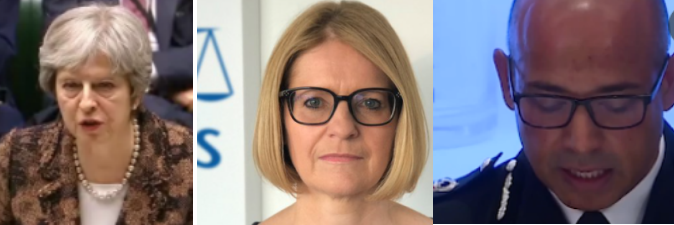
Left to right: Prime Minister Theresa May at the House of Commons, September 5, 2018; Sue Hemming, Director of Legal Services of the CPS; and Neil Basu, Assistant Commissioner of the Metropolitan Police for counter-terrorism.
“With respect to the two individuals,” May told the House of Commons referring to Petrov and Boshirov, “as the Crown Prosecution Service and Police announced earlier today, we have obtained a European Arrest Warrant and will shortly issue an Interpol red notice.” She alleged that there was “sufficient evidence for the independent Director of Public Prosecutions to bring charges against two Russian nationals for: the conspiracy to murder Sergei Skripal; the attempted murder of Sergei and Yulia Skripal and Detective Sergeant Nick Bailey; the use and possession of Novichok; and causing grievous bodily harm with intent to Yulia Skripal and Nick Bailey.”
May added: “this was not a rogue operation. It was almost certainly also approved outside the GRU at a senior level of the Russian state.” By “senior level”, May was attacking, not only GRU, the military intelligence agency of the Russian General Staff, but the Kremlin. “We were right to act against the Russian State in the way we did. And we are right now to step up our efforts against the GRU.”
At the same time as May made these allegations, Sue Hemming, director of legal services for the Crown Prosecution Service (CPS), announced: ““We have, however, obtained a European Arrest Warrant which means that if either man travels to a country where an EAW is valid, they will be arrested and face extradition on these charges for which there is no statute of limitations.” Months later, Henmming was awarded the medal of Commander of the British Empire (CBE) “for services to law and order, particularly in counter terrorism.”
Neil Basu of the Metropolitan Police (Met) repeated May’s and Hemming’s claim that the arrest warrants had been issued: “I would like to start by thanking the Crown Prosecution Service for their independent assessment of the evidence in this case… Today’s announcement by the CPS marks the most significant development in these investigations. We now have sufficient evidence to bring charges in relation to the attack on Sergei and Yulia Skripal in Salisbury and domestic and European arrest warrants
have been issued for the two suspects. We are also seeking to circulate Interpol Red Notices.”
Just before the Novichok attack alleged against the Skripals on March 4, 2018, Basu had been promoted to become the assistant commissioner of the police in charge of special operations. The promotion was announced publicly on March 5, 2018, the day after the alleged attack.
All three announcements – May’s, Hemming’s, and Basu’s — had been fabricated; for details read the book.
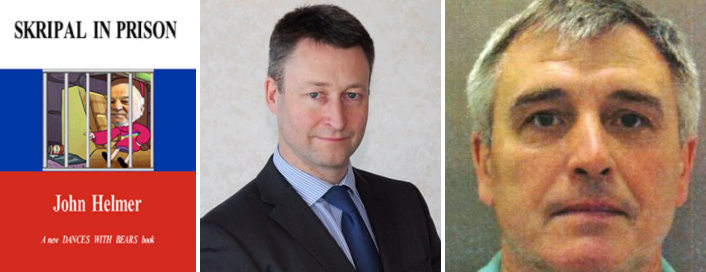
Left: Skripal in Prison, published on February 13, 2020. Centre: Deputy Assistant Commissioner Dean Haydon. Right: Denis Sergeyev (alias Sergei Fedotov). As reported in the book to February 2020, no Interpol Red Notices have been issued for the accused Russians. Interpol continues to report this.
As Basu rose to the top of police ranks in London, Dean Haydon was promoted as his deputy and the senior coordinator for counter-terrorism. Three years later, on September 21, 2021, Haydon announced to the London press that a third Russian military intelligence officer had been added to the list of those accused of the Novichok attack; he implied that Denis Sergeyev (aka Sergei Fedotov) had been charged in a new European Arrest Warrant. “All three men – ‘Sergey Fedotov’, ‘Alexander Petrov’ and ‘Ruslan Boshirov’ – are now wanted by UK police,” Haydon said, “and arrest warrants [sic] are in place for all three. The process of applying for Interpol notices will commence for Sergey Fedotov today, with Interpol Notices already in place for both Petrov and Boshirov.” This was a new fabrication. British journalists reporting Haydon’s new claim did not check what arrest warrants had been issued, if any.
Since 2012 the official form of application required of the European Union states for the issue of an EAW looks like this. European Union law, and the British procedures that have followed the EAW practice, have required the CPS prosecutors to apply to a magistrate’s or Crown court to approve the warrant application and sign it. For background on the EAW scheme, read this. Also, for a compilation of the court cases which have regulated how EAWs have been administered, click to read this publication by the coordinating European agency, Eurojust.
The Brexit negotiations, resulting in the Trade and Cooperation Agreement (TACA) between the UK and the EU, concluded by halting the EAW scheme, but substituting an equivalent scheme of arrest warrants. This new scheme still requires approval of a CPS application by a magistrate or a Crown court judge. From January of this year, no EAW has been issued in the UK.
The UK National Crime Agency (NCA) is a national police agency, comparable to the FBI and appointed by the Home Secretary; it describes its role “to lead the UK’s fight to cut serious and organised crime. An integral part of UK law enforcement, the NCA will have strong, two-way links with local police forces and other law enforcement and intelligence agencies.” Unlike the CPS, the NCA is not independent of government direction or control.
A document for internal use by a regional UK police force confirms that the NCA is the lead agency for holding all EAWs, and relaying requests to and from police around the country. “All incoming and outgoing EAWs”, the police manual says, “will be dealt with by the National Crime Agency (NCA)”.
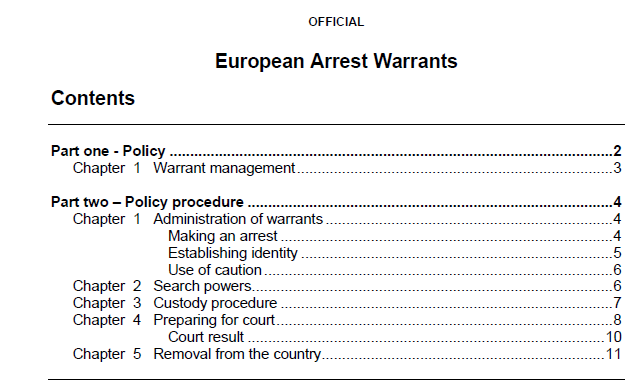
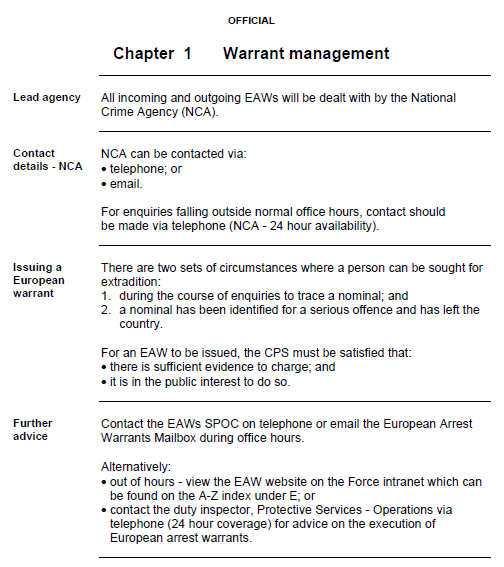
Eurojust and its related EU agency, the European Judicial Network (EJN), confirm that the NCA has been the British counterpart for European state prosecutors and police in tracking those wanted for arrest in the EAW system. The NCA also gathers, stores, and reports the data on British requests for arrests, as well as the outcome of EAWs issued by the UK or received by the UK.
WANTED BY THE UK — EUROPEAN ARREST WARRANT STATISTICS BY THE NCA
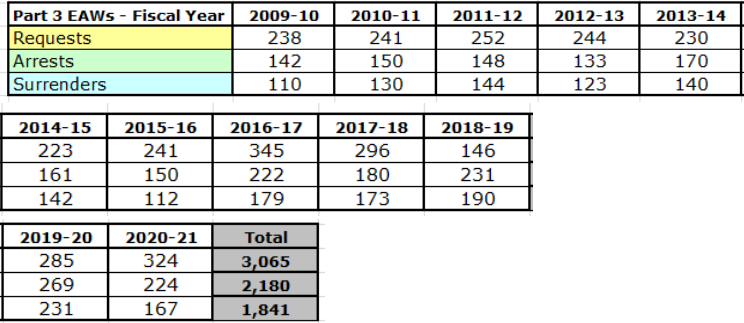
Source: https://nationalcrimeagency.gov.uk/
Click to read NCA’s description of its role in the EAW system:
https://nationalcrimeagency.gov.uk/
The High Court in London has confirmed that since the start of this year “the EAW regime can no longer operate properly as intended, because the UK’s departure from the EU has removed the jurisdiction of the Court of Justice of the EU (CJEU), which is essential to ensure uniform application of the Framework Decision… Finally, since 1 January 2021, the UK no longer has access to the Schengen information System II (SIS) for the purpose of surrender and removal arrangements. This is a further matter which renders the operation of the EAW system impossible.” For discussion of the implications of Brexit for the arrest warrants and for extradition proceedings in the UK, read this.
The NCA is currently headed by Graeme Biggar. He was directly involved in the Novichok operation in 2018 as “Director National of Security in the Home Office, Graeme worked on countering terrorism and state threats. His experience includes helping shape the response to the 2017 terrorist attacks, the Salisbury attack, and overseeing the Investigatory Powers Act implementation programme across government.” Biggar was awarded the CBE for this record.

Left, Graeme Biggar, appointed Director-General of the National Crime Agency (NCA) in October 2021. Right, Ton Van Lierop, Eurojust Spokesman.
This week the CPS and NCA were asked simultaneously to prove that the European Arrest Warrants had been issued for Petrov and Boshirov, as was announced in September 2018. They were also asked to identify for the EAWs on record for the first two Russians, plus Sergeyev (Fedotov), document and case reference numbers, date of issue, and the signing authority.
A spokesman for the CPS replied that EAWs “have been issued for all three suspects”.
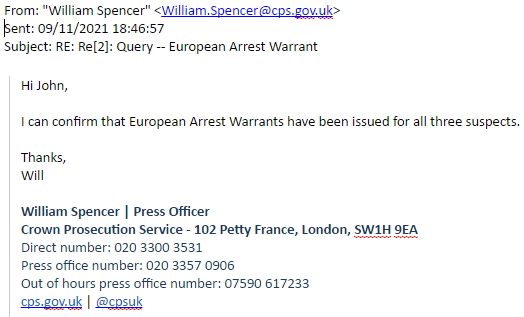
When asked for a copy of these EAWs or any other form of proof, Spencer’s boss, Robert Cox, a senior press officer at the CPS, refused point-blank:

The same questions were asked of the NCA. At first, Biggar’s spokesman, unaware of the answers which the CPS had already given, replied: “we think you might be better placed speaking to the Crown Prosecution Service (CPS) – you can ring them on 020 3357 0906 or send them an email on cps.pressoffice@cps.gov.uk .”
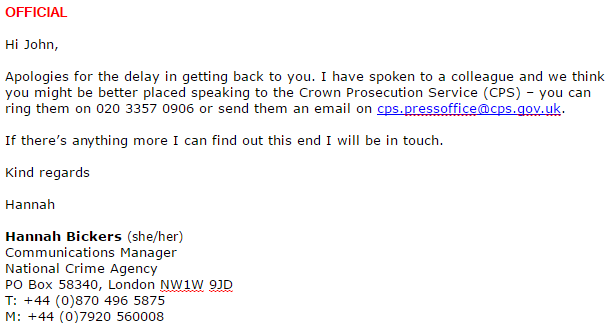
When this was challenged as evasive, NCA responded by claiming it “is not able to comment on arrest warrants where we are not the requesting or investigating body.”
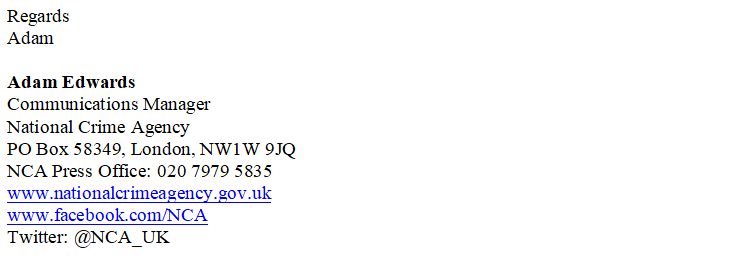
Taken together, the two British agencies, the CPS and NCA, were claiming that three EAWs had been issued, despite the fact that in the Sergeyev (Fedotov) case, no EAW was legally possible when this was announced publicly in September. But was the CPS repeating the press releases, and the NCA avoiding the request to provide proof?
To check the British claims, Eurojust in The Hague was asked to say what EAW records or subsequent arrest warrant for Sergeyev (Fedotov) their database reveals. The answer, given yesterday, is that there are no records at all.
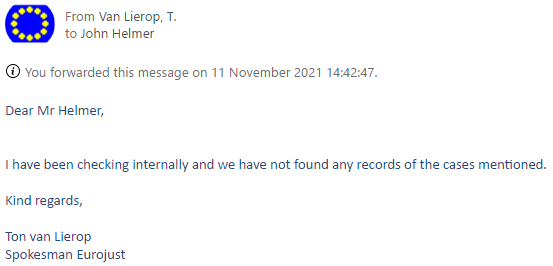
This is evidence that the British prime minister, the chief prosecutor, the chief of the NCA, and the senior Met officers have all lied. Their accusations against the three GRU men have turned out to be no more than press releases. Not a single British newspaper, broadcaster or reporter has made this discovery. The European media remain equally silent.











Leave a Reply